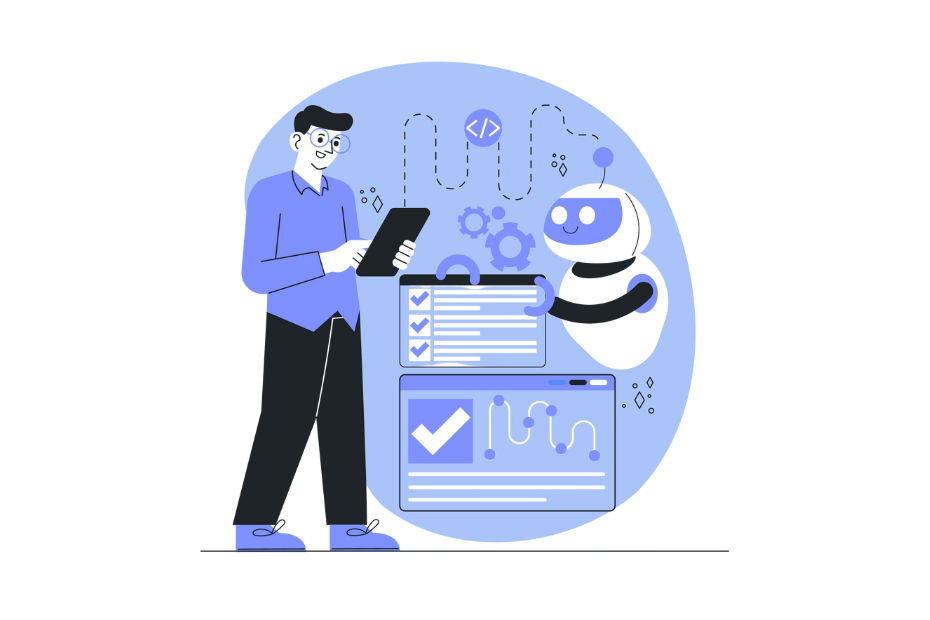AI takes the early chaos in a team and turns it into a steady rhythm that the whole startup can actually follow.
There comes a point in an early startup where things inside suddenly feel a lot lighter. Workloads start falling into better places. Teams quit getting buried under all those repetitive jobs. Progress no longer seems like some endless fight. That point often hits when AI enablement moves from just an extra option to something built right into the company’s daily operations.
This shift does not look dramatic from the outside. It stays quiet. It does not come with any big launch energy. It feels more like someone flipped on the lights in a dark room where the team had been bumping around blindly.
The business begins to flow smoothly because the behind-the-scenes stuff no longer depends only on people doing it all by hand.
Founders often refer to this moment as the switch.
When AI Starts Handling the Quiet, Repetitive Work
Every young team goes through that messy phase. Support requests pile up in inboxes. Marketing tests take way too long. Product cycles drag on past what anyone planned. Finance tasks pull people away from actual growth. The team has the skills, but ends up totally overloaded. AI fixes this faster than most founders figure it will.
This is a core part of AI readiness for startups.
- This rhythm counts for a lot because early chaos does not stem from poor planning. It comes from plain human limits. When AI takes over the predictable jobs, the team gets their time back.
- They can start thinking clearly again.
- They can innovate once more.
- They can plan properly again.
- That brings the momentum back into play.
When AI Turns Into the Engine Behind Your Momentum
Speed turns real when AI integration for startups supports the core parts of the company. Startups grabbing AI early run in a way that seems almost unfair to others.
They move quickly because decisions rest on actual patterns instead of just guesses. They stay leaner since AI wipes out the repetitive stuff.
They outthink larger competitors because workflows adjust right on the spot.
Several studies on early stages show that AI recommendation features boost engagement a lot once basic data starts feeding the models.
Other research indicates that AI helps with campaign choices, leading to better accuracy and customer reactions. It beats out manual targeting every time.
Founders who put off AI often find competitors already ahead. Those rivals get faster product updates. They have sharper analytics. Their marketing hits more accurately. They cut down on operational drag.
A strategist in one AI readiness study noted that founders adopting AI early spot product improvements quickly. User behavior shows up in ways they never noticed before.
AI shifts from an accessory to the main power source.
How AI Keeps Your Startup Moving Smoothly
Founders hitting this stage talk about a common change. Tasks run smoothly overall. Meetings get shorter. Bottlenecks vanish. The team quits wasting time on draining work. People start putting hours into spots where they truly matter.
AI enablement for startups works like glue, holding together four key areas.
- Product
- Operations
- Growth
- Strategy
Teams turn to managed AI services along with simpler data pipelines and ready-made generative tools. These cut out a ton of engineering hassle. Once this setup gets going, product features adjust to how users act. Support answers come quicker. Financial reviews lighten up. Marketing quits depending on hunches.
Founders from these reports said AI cut out internal doubts by providing cleaner data and solid forecasts. One advisor on a future readiness panel put it this way. Clear data handling and governance build investor trust. It shows real control and maturity. This clarity turns into the company’s everyday workflow.
The Simple Shift That Strengthens the Entire Company
The main mix-up about AI enablement involves thinking it needs massive engineering spend. It does not work that way. Momentum kicks off with just one small decision.
Pick a workflow draining your team right now.
- Support inbox.
- Lead qualification.
- Internal search.
- Content creation.
- Basic analytics.
- Financial review.
Choose one task holding the company back and add an AI tool or managed service to it. Set one clear goal for it. Run it for a week. Teams sense the change pretty fast.
A small crew suddenly manages work that used to need extra people. Tasks that felt overwhelming turn doable. Endless jobs become simple. This change sends strong signals to investors. It builds customer trust. It frees the team to zero in on what counts. This is the move that starts unlocking everything else.
When AI Becomes the Foundation for Real Growth
AI enablement, AI integration, and AI transformation work best when they are woven into the company quietly. They show impact without demanding attention. They make the product smarter. They support the operations. They give teams breathing room. They turn scattered effort into forward motion.
Founders who reach this stage describe it simply.
• The business finally moves together.
• The team has clarity.
• The product improves steadily.
• The company acts with purpose.
This is the shift every founder is chasing. And in 2025, AI enablement is the switch that unlocks it.
